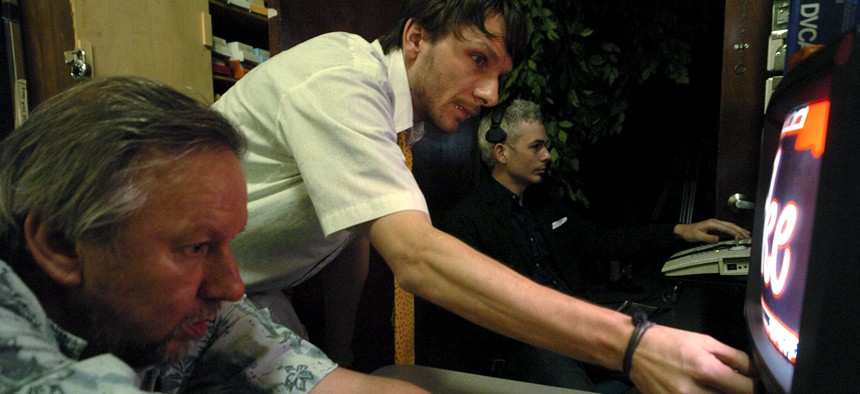Future of Televised City Council and School Board Meetings Could Be in Doubt

Volunteers monitor the audio and video feed during a production in Chapel Hill, North Carolina, in 2006. AP Photo

Connecting state and local government leaders
An FCC order allows cable companies to deduct the value of services they provide to states and localities from the fees they pay, which local government officials say could jeopardize public access channels.
The future of public access channels that run city council and school board meetings on cable television could be in doubt under a new order approved by the Federal Communications Commission this week limiting local and state authority over cable companies.
The order, which has been under consideration for months, spurred thousands of comments. State and local leaders told the agency that it could jeopardize the public access stations that communities count on to get out local news, religious services and emergency broadcasts, as well as “institutional networks” (I-NETs) that many municipalities use to provide cable, phone and internet services to government buildings.
The FCC approved the order by a 3-2 vote, with the two Democratic commissioners voting against it. At question was the franchise fee that local or state governments can charge cable providers, which is set at up to 5% of television service gross revenues. In a change from longstanding policy, the FCC decided that companies can now deduct the fair market value of in-kind services that many provide as part of their agreements—such as public access channels, discounted service to elderly residents and the I-NETs—from those fees that typically flow into general funds. (The order exempts some capital costs that cable companies pay for stations.)
FCC Chairman Ajit Pai said the fees and regulations imposed by governments inhibit the ability of cable companies to expand broadband internet service and get passed along to consumers.
Local governments “have not cracked the secret to a free lunch,” said Pai, who is part of the Republican majority. “Moreover, every dollar paid in excessive fees is a dollar that by definition cannot and will not be invested in upgrading and expanding networks.”
Brendan Carr, another Republican FCC commissioner, said some local governments have “taken advantage” of their regulatory authority by making cable companies provide free service to “municipal liquor stores and government-owned golf courses.”
Michael Powell, president and CEO of the Internet & Television Association, heralded the FCC order, saying it will result in broadband being available to more households.
But Democratic Commissioner Jessica Rosenworcel said the FCC’s move should be considered within the larger context of the decreasing availability of local news coverage, echoing concerns that public access channels will end up closing. “It goes beyond placing reasonable limits on contributions subject to the statutory franchise fee and jeopardizes the day-to-day costs, like staff and overhead, required to run such stations,” she said.
In a letter opposing the change, New York City said the fire department uses the city’s I-NET to provide cable and internet service to every firehouse, as well as tapping it for “critical public safety communications.”
“Presently, there are no viable alternative services available to the city. The only potential long-term solution would be to build a parallel network, which will take years and cost a massive amount of money for which the city has no funding available,” the letter said.
Angelina Panettieri, the principal associate for technology and communications for the National League of Cities, said it’s unclear how the order will play out. “How many cable companies are going to go back to franchise authorities—whether that is a state or locality that they had a franchise agreement with—and say, ‘Now we will pay you this amount less’?”
But Panettieri noted that the final order will go into effect 30 days after it is published in the Federal Register, which means the impact on budgets could become clearer soon.
The head of a Massachusetts public access station told the FCC that a reduction in franchise fees could jeopardize a new studio facility that was just completed after ten years of planning and the expenditure of $600,000 on construction and equipment costs. “We may not be able to sustain the new facility that we responsibly and prudently planned for over the last 10 years,” wrote Brian Fraser, executive director of North Andover Community Access & Media Inc., in a letter.
In another part of the order, the FCC says local and state governments can’t regulate the broadband networks being rolled out by cable companies, which are an increasingly large component of their businesses.
The order restricts local and state governments’ abilities to have influence over a growing part of the market, said Panettieri. At the same time, she noted that the FCC doesn’t direct the providers to spend the savings on building out networks or reducing prices.
“Where are these savings going to go? Are they going to go to consumers? There is nothing to ensure that that happens,” she said.
Panettieri said litigation over the new order is expected, just as cities sued over another FCC’s decision limiting local authority in the buildout of small cell 5G networks.
Laura Maggi is the Managing Editor at Route Fifty.
NEXT STORY: Ready or Not, Blockchain-Based Mobile Voting Is Getting Closer





